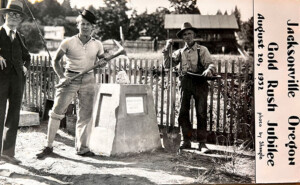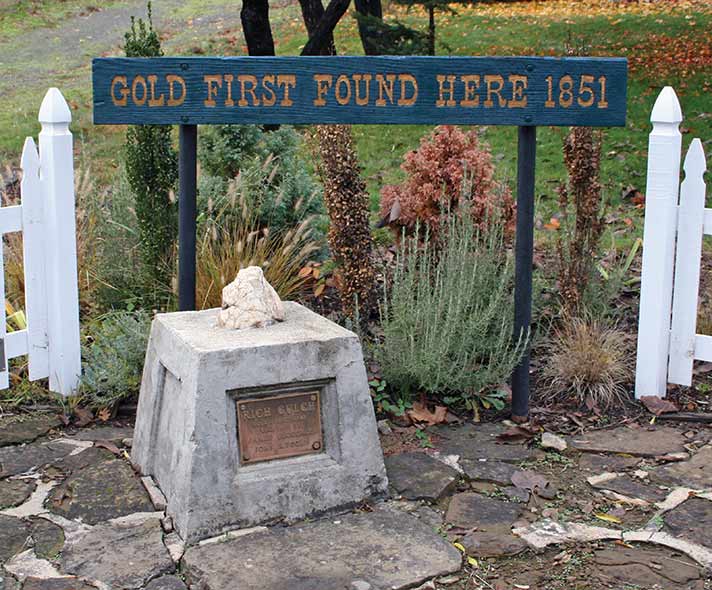Pioneer Profiles – May 2022
The Jacksonville Boosters Club and the City are exploring a project that would refurbish one of Jacksonville’s Historic Landmarks, the “Gold First Found Here” marker on Applegate Street where it crosses Daisy Creek just after it branches off South 3rd. The original marker was placed there in 1932 by the Jacksonville Chamber of Commerce as part of the town’s first Gold Rush Jubilee. The marker subsequently fell prey to vandalism and in 1967 the Jacksonville Garden Club replaced it with the current replica.

Installation of the original “Gold First Found Here” marker in 1932. Photo courtesy of Katharine Gracey, current owner of the property where the marker is located.
The marker attributes the “Gold First Found Here” discovery to James Clugage and James Pool, two “packers” who supplied California’s gold rush mining camps with goods and provisions from the Willamette Valley. But, contrary to local lore, Clugage and Pool did not make the initial gold discovery in Southern Oregon, and the Applegate Street location was not where it would have been discovered. However, they may well deserve credit for triggering the Southern Oregon gold rush of 1852, and Clugage and Pool definitely deserve the credit for staking claims to what proved to be a different kind of gold mine—the donation land claims that became the City of Jacksonville.
As the 1849 California gold rush played out and large mining corporations took over the most productive sites, miners migrated north looking for new gold strikes in Southern Oregon. Territorial Governor Joseph Lane explored the Rogue River area in 1850 to assess potential mineral resources. Several gold discoveries were made in the Illinois Valley area at Josephine and Canyon creeks and at Sailor’s Diggings before the First Rogue River Indian War broke out in June of 1851 and miners temporarily left their claims to join the conflict.
With the cessation of warfare, Clugage and Pool, resumed operating their “mule ass freight.” Records now available indicate that it was early February of 1852 when Clugage and Pool spent a night at the homestead of the local Indian agent, Alonzo Skinner, near the Table Rocks. There they learned that in the late summer or early fall of 1851 Skinner’s son and one of his employees, a Mr. Sykes, had struck gold in Jackson Creek near the western edge of Jacksonville’s current city limits.
When Clugage and Pool resumed their journey the next day, they stopped for lunch in the area near Skinner’s and Sykes’ find. While watering their animals, Pool, an experienced miner, found “color” in the water—gold!
There are many variations to the Clugage-Pool story, but whatever the source of their gold discovery, they continued their journey to Yreka, then the region’s claim and assay headquarters, where Clugage filed Donation Land Claim #37 on 160.11 acres covering virtually all the western half of Jacksonville, and Pool filed a 306 acre claim immediately to the east.
What Clugage did next was unusual: he publicized the claim! In May of 1852, Clugage wrote both The Shasta Courier and the manager of stage lines out of El Dorado County that he and his two partners had a claim from which they had taken an average of 70 ounces of gold per day for 10 weeks! The news was immediately reported to the Daily Alta California, a San Francisco newspaper. By May 20, Indiana newspapers were carrying the report of rich mines in the Rogue River Valley.
Prospectors swarmed to the area. Within a few months, over three thousand miners started claiming and excavating every creek bed in the region. Tent cities sprang up everywhere. The serene forest was transformed into a burrow of restless activity.
At a time when most mining claims were well kept secrets, why would Clugage choose to share their discovery with the world?
In a Historic Context Statement for Jacksonville’s 1993 Historic and Cultural Resource Inventory, George Kramer surmises a reason for the incongruity:
“From their packing experience, both Clugage and Pool were familiar with the bounty of the lush Rogue River Valley and probably…aware of its potential for settlement. With the discovery of gold, one or both likely realized the need for, and the potential profit in, a permanent town in the otherwise sparsely settled valley. Only a few weeks before their… discovery, the region had been formed into Jackson County, a county in need of a seat that would benefit from the influx of government monies. In this light, Clugage’s immediate Donation Land Claim application, coupled with his seemingly strange desire to publicize the gold strike at Rich Gulch, make sense and speak to his business acumen rather directly.”
Kramer’s hypothesis is reinforced by the fact that Clugage hired George Sherman to survey and plat a township, paying Sherman with a deed to the block of land bounded by B (California) and C streets and 4th and 5th streets. Clugage was later the first person in Southern Oregon to obtain a U.S. patent (deed) recognizing his donation land claim holdings.
Clugage initially named the town Table Rock City. When it was named the county seat in 1852, the town’s name was changed to Jacksonville, and Clugage was one of three officers appointed to oversee the affairs of the new county.
Pool either became partners with or sold his holdings to Henry Klippel. The Pool and Klippel Addition became Jacksonville’s first “subdivision” in 1868.
Author’s notes: Clugage fought in the Rogue Indian Wars under General Lane. He had been a renowned horse buyer in his earlier days in Ohio and put this experience to good stead, becoming partners with Drum in the Union Livery Stable and establishing a tri-weekly stage route to Crescent City in 1858.
The Morning Oregonian reported in its November 26, 1870, edition that Clugage had been named Superintendent of the Oregon stage lines. However, we believe this reference to be to his brother, Frank Clugage, who also ran stage lines, since James Clugage seems to have left the west permanently by 1863. The 1870 U.S. Census lists James Clugage as a retired land speculator living in Union County, Ohio. In 1872 a James Glenn appears on the Jackson County jury list as “representing James Clugage who has moved from Oregon.”
Clugage apparently became insane. Beside his name in a Methodist Church donors list is “gone crazy.” A good friend published a tribute shortly after Clugage’s death in 1886 at his home in Marysville, Ohio. He wrote that “his mind became clouded, caused by suffering exposure and freezing…. Before that he was one of the kindest hearted and most liberal men I ever knew.”
Clugage’s name is sometimes spelled with two”g’s” but his official donation land claim and deed show only one. Pool is sometimes shown being spelled as Poole and in some things his name has been changed from James R. to John R. James R. Pool was the official usage. It’s thought that Pool was illiterate and may not have been aware of the discrepancies….
Pool subsequently mined in Yamhill County in 1860. According to the Oregon Archives, he died in California in 1869.

Thank you for your accuracy in supplying all this interesting information about Jacksonville. I purchased the Historical Reames house and so I am interested in anything to do with the local history.